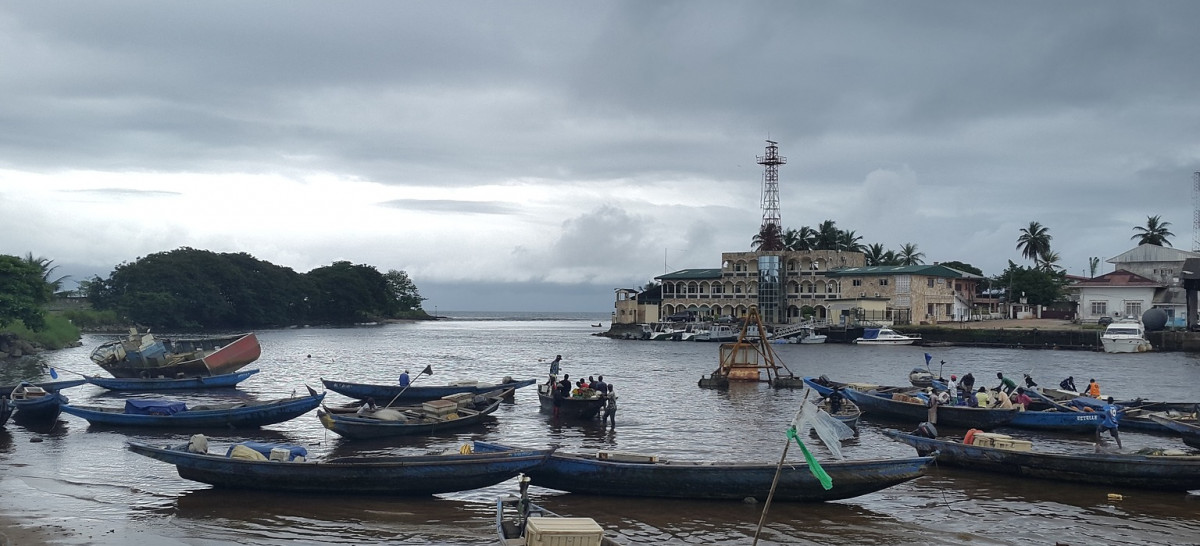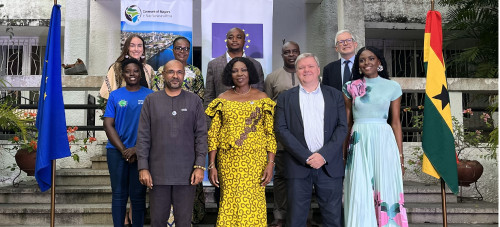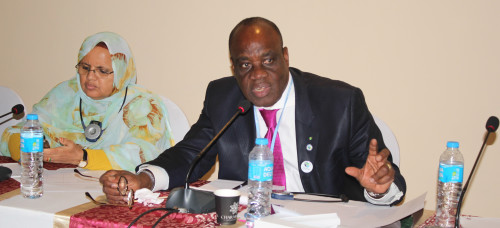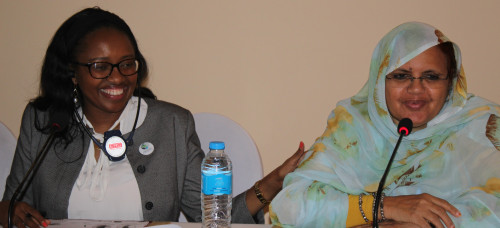Cameroon Mayors to prioritise energy and climate in development plans
Published: 4 Mar 2019

In Bonaberi, a neighbourhood on the outskirts of Cameroon’s economic capital, Douala, Elodie is relieved to find a temporary home for her family. Elodie, a resident of Manoka was displaced alongside her children and hundreds of people by flooding in this island off the coast of Douala. Manoka is becoming increasingly vulnerable to heavy flooding and villagers, who have been displaced many times, fear their community could be swallowed by the waters, but cannot do much to protect their homes.
Coastal erosion and regional flooding have displaced many people in different parts of Cameroon. In December 2015, Cameroon’s Ministry of Territorial Administration and Decentralization said more than 120 villages had been destroyed together with thousands of hectares of farmland within a period of 3 years. The situation is even worse today with extreme weather conditions that include severe drought in the northern regions and heavy monsoon rains that have often paralyzed the capital city, Yaounde.

Flooded roads in the coastal city of Limbe, Cameroon. (photo: Africanews)
These extreme changes in weather conditions are having a negative impact on the livelihoods and health of people in Cameroon, and are often linked to lack of preparedness at local level that could give the country the capacity to better respond. Access to energy also remains a major issue in this West African state.
Aware of this gap, the Covenant of Mayors in Sub-Saharan Africa (CoM SSA) initiative is supporting local governments in Cameroon with the capacity to effectively combat climate change and provide access to clean energy. Through the CoM SSA approach, local governments integrate climate change adaptation strategies in their local development plans to protect and improve the livelihoods of their populations.
In partnership with the United Nations Human Settlements programme (UN Habitat), the Covenant of Mayors in Sub-Saharan Africa organised a national workshop to help Cameroon mayors gain better understanding of the CoM SSA initiative. The workshop held in Yaounde from 13 to 15 February and brought together over 80 representatives of local governments in Cameroon. This included 15 signatories and some of the 58 municipalities that have signed the pre-engagement letter. During this 3-day climate and energy workshop, facilitators provided detailed information about the CoM SSA initiative and stressed the need for local governments to be part. Participants were taken through the process of developing a Sustainable Energy Access and Climate Action Plan (SEACAP) for their cities, using the example of the city of Kampala as a case study.
“We have learned that after signing the covenant of mayors and submitting our political commitment, we can have support to develop our action plan. The experience of the Mayor of Kampala Capital City has helped us to decide definitely that access to energy will be our priority for the next five years,” said one of the participants, Elise Mballa Meka, Mayor of Akom II municipality, South of Cameroon.
“This workshop helped me a lot because we often think that European Union projects only involve big metropolis. However, I have learned that small municipalities like ours are also eligible for some EU projects,” said Ms. Mballa.

Mayors and representatives of local governments at the workshop (photo: Vanessa Vovor)
During the workshop, the municipalities of Yaounde III and Yaounde IV presented their sustainable pilot projects on access to energy and climate. Professor Agbati Camil Koffigan also presented the project of the city of Tsévié in Togo, while Joel Nana of Sustainable Energy Africa presented the development process of the Sustainable Energy Access and Climate Action Plan of the city of Kampala in Uganda – a pilot city of Covenant of Mayors in Sub-Saharan Africa.
In her presentation, CoM SSA project officer, Vanessa Vorvor stressed the importance of joining the Covenant of Mayors in Sub-Saharan Africa initiative to mayors. She also talked about the next phase of the CoM SSA initiative that will bring support from the German development agency, GIZ to some Cameroon municipalities and help them develop bankable projects. “To benefit from it, you need to be signatories first,” said Ms Vovor.
Dr Vincent Kitio, head of the Urban Energy unit at UN Habitat also urged participants to make full use of the CoM SSA initiative to develop their cities. “The Covenant of Mayors in Sub-Saharan Africa is a tool to fight climate change and improve access to energy, and therefore is a very good means of sustainable development for Cameroon,” he explained. Dr Kitio also lauded the involvement of women in the initiative, saying that less than 3% of Mayors in Cameroon are women. Yet, women are leading over 20% of Cameroon municipalities that have signed the covenant.
The Covenant of Mayors in Sub-Saharan Africa is an initiative founded by the European Union (EU) to support Sub-Saharan Africa cities in their fight against climate change and ensuring access to clean energy, through a voluntary commitment. It is a bottom-up initiative that allows cities to define and meet ambitious and realistic targets set by themselves in line with the covenant methodology.
“Local governments such as municipalities and cities are key players in addressing the dual challenge of climate change and access to energy. The European Union supports this initiative with more than €40 million,” said Felice Zaccheo, head of unit for Sustainable Energy and Climate Change at DG DEVCO, European Commission.
Adding his voice towards more sustainable, climate-resilient and vibrant cities, Serge Ondoa, the representative of Cameroon’s Minister of Decentralization and Local Development (MINDDEVEL) called on all cities and municipalities in Cameroon to join the CoM SSA initiative.
“The climate change theme has strong links with national recommendations for local development. The Covenant of Mayors in Sub-Saharan Africa is part of the process of decentralization,” said Mr Ondoa. “We invite municipal authorities to join the Covenant of Mayors in Sub-Saharan Africa so that the fight against climate change becomes a reality in our country.”

Cameroon’s Minister of Habitat and Housing, Célestine Ketcha Courtès chaired the closing ceremony (photo: V. Vovor)
In Cameroon, climate change is happening so fast that crops and homes are being destroyed all the times. Initiatives such as the Covenant of Mayors in Sub-Saharan Africa will help local governments permanently ensure the protection of people, goods and the environment against the risks of natural disasters or catastrophes and reverse the effects of these disasters.
Cameroon’s Minister of Habitat and Housing, Célestine Ketcha Courtès chaired the official closing ceremony. “It is a great pleasure for me to be here as Minister after being one of the first mayors to join the Covenant of Mayors in Sub-Saharan Africa,” said the former Mayor of Bangante in Western Cameroon. “The tools and knowledge developed and shared over the past three days will have a positive impact on the development of our country’s living environment.”





